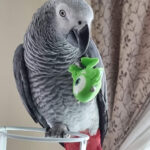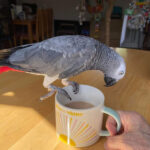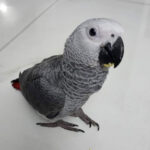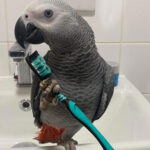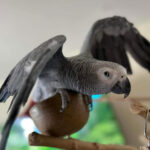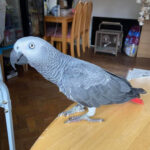- By chestergrey
- In Uncategorized
What Should I Feed My African Grey?
What Should I Feed My African Grey?
What do African Greys Eat in the wild?
In the wild African Grey parrots are “granivores and frugivores.” (Pollock). Meaning they “eat a variety of seeds, nuts, fruits, berries and vegetation in the wild. They will clamber from branch to branch while feeding instead of flying. They especially treasure the fruits of the African oil palm tree native to their environment.” (Axelson). Although, the fruits of the African oil palm tree “would be too rich for captive birds except as a rare treat.” (Schwarz).
African Grey Parrot
How can I replicate this diet in captivity?
For many years it was believed that bird seed and water were the perfect parrot diet, “seed has been considered the standard for so long that many owners believe that is all it takes to provide a healthy and balanced nutritional diet for their birds. But make no mistake about it – it takes a lot more than that.” (The World Of African Grey’s.) Quite frankly “Poor nutrition can mean a life cut in half. It could even be a life full of pain and misery for sure. Even birds that live on an “adequate parrot diet” can end up having a myriad of health problems including liver disease, feather disorders, respiratory problems and other issues.” (The World Of African Grey’s). As humans we have a tendency to feed our parrots any human food we deem worthy, be aware this could be fatal.
For a full list of toxic foods please refer to our toxic foods list.
Vegetables
As with most other parrots, African Greys require a large amount of fresh veg in their diet. Ideally you should feed as much variety as possible, as each vegetable contains different nutrients. Ingredients to feed regularly include, but are not limited to: kale, broccoli, cauliflower, carrot, sweet potato, sweetcorn, pumpkin, courgette, mangetout and green beans (Sellick).
“Neither seeds nor pellets contain enough Vitamin A. For this you need green vegetables and orange fruits. Whether you offer pellets, seeds or chop as the principal part of the diet, your bird needs fresh produce. A healthy bird that has been eating correctly will have bright eyes, shiny plumage and an upright stance.” (Schwarz). Vitamin A deficiency is the most common problem caused by a poor parrot diet. Leafy greens, green vegetables and most orange fruits and vegetables usually provide enough vitamin A to solve the problem (The World Of African Greys)
Any fresh food given to your African Grey must be removed after 4-5 hours to avoid fruit flies and bacteria growth, which could pose a health risk to your bird.
For a full list of parrot safe vegetables please refer to our safe foods list. If you’re struggling to get your bird onto veggies, please refer to the relevant section on our website.
Fruit
Some fruits you can offer your African Grey include Bananas, blueberries, strawberries, pineapple, watermelon, blackberries, cherries, grapes, kiwi, mango, orange, plums, pomegranate, pawpaw, passion fruit, raspberries, peach, banana peel, pears, raisins, dates, apples, papaya, melon, apricots etc. (Schwarz)
Due to the fact that fruits are high in sugar, they are a fantastic source of energy. As captive African Grey’s cannot exercise as much as their wild cousins, however, feeding too much sugary food may cause some undesirable behaviours like biting or excessive screaming. It is therefore best to always feed fruits in moderation (Sellick). As a rule of thumb for a good balanced diet, approximately 10% of an African Grey’s diet should be in fruits, and 50% in vegetables.” (Bird Street Bistro).
For a full list of parrot safe fruits please refer to our safe foods list.
Dry Seed
Although seeds are a natural part of an African Grey’s diet, they will rarely – if ever – find dried seed in nature. Similar to fruits and their high sugar contents, most dried seeds contain a lot of fats. Dry seed is a good addition to your parrot’s diet as long as it is not a majority. Seed is best given in moderation as too much can lead to obesity due to the high fat content (Roberts). Specifically sunflower seeds are best to avoid, as many parrots find them incredibly tasty and will pick them over anything else presented to them.
Although wild African Greys have access to seed all year round, “the types of seeds they feed on change throughout the year, as different plants come into season. The commercial seed mixes offered to many captive parrots tend to be high in fat and deficient in many nutrients. If these mixes are fed as the only source of food, African grey parrots could become ill and ultimately die prematurely. To make matters worse, often, birds will pick through a large bowl of commercial seed mix and selectively eat 1 or 2 “favorite” types of seeds, limiting their nutrient intake even further” (Axelson). To add to this, most commercial seed mixes lack in over 30 essential nutrients, meaning that a dry seed based diet is definitely not ideal for these animals (Sellick).
Since parrots hull (re
move the outer shell) from seeds before ingestion, they do not require grit. “In fact, some individuals will overeat grit when ill, putting them at risk for impaction.” (Pollock)
For a full list of parrot safe seeds please refer to our safe foods list.
Pellets
Many people suggest to use a “complete or pelleted food as a base diet, approximately 60-80% of their daily intake, with the remainder of the diet comprising of vegetables, sprouting seeds, fruits, nuts, seeds plus other treats.” (Northern Parrots) A balanced pellet includes many of the vitamins, minerals and other nutrients that are vital for an African Grey, however pellets should NEVER be the only food a bird gets. Although most packaging will state “complete diet”, parrots still need a lot of variety. It is best to mix pellets in with other dry foods, such as seeds and dried flowers or vegetables.
For a guide on how to find a good quality pellet, please refer to the relevant section on our website.
Dried Ingredients
Greys’ love flowers and most are suitable, for example roses, marigolds and sunflowers which do have food value. However, as always be cautious as some flowers are poisonous, e.g. shamrock, holly, poinsettia, datura, laburnum, ivy, mistletoe, daffodils and lilies (Schwarz). Dried flowers often have great nutritional value or even calming properties – for example, chamomile is known to be calming and even relieve anxiety in parrots (Stephens). Studies also suggest chamomile flowers are excellent calming herbs and can be offered to parrots in avian tea to relieve anxiety and maintain a calmer mood (Burroughs). Other options include dried vegetables such as carrot, beetroot, broccoli, pumpkin etc.
Dried ingredients can be useful when encouraging your parrot to forage, further enriching their lives. For a guide on foraging, please refer to the relevant section on our website.
For a full list of parrot safe flowers, herbs and spices please refer to our safe foods list.
A mix of dry ingredients to feed your parrot, including dried chilies, vegetables, seeds, herbs and flowers
Sprouts
Both seed and pellet advocates agree the sprouts are beneficial to every parrot species. (Schwarz). Sprouted foods are much more natural for any parrot than dry foods as they replicate their natural diet much closer. Soaked and sprouted seeds especially are much more nutritious than dry seeds as the soaking and sprouting process unlocks some nutrients that they cannot access in the dried form (Bird Tricks). Sprouts are also much easier for African Greys and other parrots to digest, as this is also the type of seed they would find in the wild while foraging for food (Stephens). Many birds will often prefer the taste and consistency of wet seeds as this is much more natural for them.
For tips on how to soak and sprout seeds, legumes and other ingredients, please refer to the relevant section on our website.
Grains
African Greys are classed as granivores, meaning they eat a lot of grains in the wild where this is easily accessible and available for them. In captivity, it is therefore vital to include some grains in their diet. Some grains can be fed raw, such as amaranth, barley, oats, maize or wheat, but some need to be cooked in order for your African Grey to be able to digest it. Grains that need to be cooked include rice, brown rice, pasta and quinoa (Parrot Funhouse). “An excellent addition to a Grey’s diet will also be items like wheat grass, lucerne, alfalfa or parsley that you can grow in pots outside the back door or on the balcony” (Schwarz).
As with anything, grains should be fed to your African Grey in moderation. They are high in fibre and carbohydrates, which are massively important for gaining energy. However, if given too much, your bird will struggle to burn all this energy off which will then result in obesity (Bird Tricks).
For a full list of parrot safe grains please refer to our safe foods list.
Nuts
African Greys have strong beaks which make fast work of shelled nuts. They can enjoy many nuts, including pecans, walnuts, pistachios, and almonds. Please bear in mind nuts are very fatty, they must be portioned carefully when feeding African greys (Bird Street Bistro). It’s also important to note that some nuts have a high protein content, because of this they should be fed in moderation as too much protein in your parrots diet can lead to irreversible effects such as gout and renal failure (Planned Parrothood).
Shelled nuts such as pecans, almonds and pistachios also act as a great foraging opportunity, but always ensure to buy shelled nuts from a trusted parrot supplier, such as Northern Parrots or Scarlett’s Parrot Essentials. Nut shells can sometimes contain fungal spores (V. H. Tournas) which could cause Aspergillosis in parrots.
For a full list of parrot safe nuts please refer to our safe foods list. For more information on Aspergillosis, please refer to the relevant section on our website.
Legumes
Legumes, such as beans are rich in protein and antioxidants, making them very nutritious and beneficial for our feathered friends. Legumes to offer your parrot include garbanzo beans, lentils, soybeans, pinto beans, kidney beans, and split peas (Bird Street Bistro). Although it’s important to mention you need to ensure they are both parrot safe and prepared properly. Legumes should be soaked for at least 8-12 hours, then rinsed and boiled for at least 30 minutes and then allowed to cool before feeding (Roberts). Legumes should never be a parrot’s full diet, they are simply a nutritious addition.
The protein offered by legumes is particularly important as protein helps your feathered friend’s feathers grow. It also prevents balding, “ promotes seasonal molting and natural development and keeps your African grey’s feathers beautiful.” (Bird Street Bistro)
For a full list of parrot safe legumes please refer to our safe foods list.
Calcium
African Greys can suffer from calcium deficiency more easily than other species, “which can cause seizures, possibly feather plucking and poor health.” (Schwarz), this condition is known as hypocalcemia. To avoid calcium deficiency it is particularly important to feed a well-balanced diet to prevent the development of the condition (Axelson). Dark leafy greens are a great source of calcium for your parrot. An alternative is to offer a calcium supplement for your African Grey, sourced from a trusted parrot supplier.
Other
Occasional snacks may include unsalted sweet potato chips, hard-boiled eggs (without the yolk) or well-cooked scrambled eggs. These can be a weekly treat, especially as eggs are very high in protein and should not be fed daily.
To summarize, African Greys should be offered “the full spectrum of carbohydrates, proteins, fats, spices, and other nutrients like vitamins and minerals. “ (Bird Street Bistro). It is also recommended to feed your parrot two or three times a day (Schwarz) rather than offering access to food at all times. This allows you to monitor the amount your parrot is eating as well as giving you the opportunity to offer a more varied and nutritious diet.
